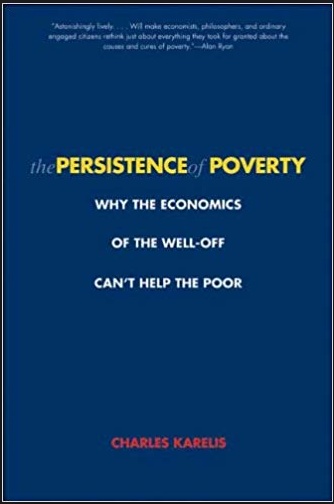
If Karelis is wrong, why have I written so much about his work? Because his arguments are so much better than his conclusion. Charles Karelis hasn’t explained poverty, but he has still enriched our understanding. He’s hardly the first person to emphasize the connection between behavior and persistent poverty, but he makes this point more forcefully and eloquently than almost anyone else. And he’s the first person to highlight the ubiquity of increasing marginal utility in real life. It’s one thing to say, “Oh, there are some non-convexities,” and another to point out lots of specific convincing examples. Karelis even has a strong meta-story about how economists have been so blind:
If your theory is correct, why isn’t it conventional wisdom already? After all, the main evidence you cite is introspected experience, and that is available to everybody. How could the fact that relievers have increasing marginal benefit have escaped the notice of the marginalists—and their followers?
I think the marginalists got the wrong answer not because they introspected inaccurately (assuming that even makes sense), but because they failed to ask the oracle of introspection the right question. (This is a common problem with oracles.)
I’d go further and say that Karelis falls short because he stopped looking for increasing marginal utilities too hastily. If he’d spent more time introspecting, he would have noticed major examples of “relievers” with standard decreasing marginal utility (like functional eyes and sleep), and major examples of “pleasers” with non-standard increasing marginal utility (hobbies, relationships, and many luxuries).
In a way, Charles Karelis is like the man who discovered Rogaine. The drug was designed to treat hypertension, but it turned out to be a cure for baldness instead. We should praise him for his intellectual contributions, even though they’re rather different than he intended.


READER COMMENTS
nobody.really
Aug 20 2019 at 10:15am
Eh. Not impressed with Rogaine.
I think the metaphor you’re looking for is Viagra. Pfizer created it to help cardiovascular problems by dilating blood vessels. It worked in lab animals, so they tried it in humans. It seemed to work ok there, too–but a nurse noted that the men in the study, when she came to check on them, were always lying on their stomachs. They were embarrassed by their erections. And thus was discovered Viagra’s true economic potential.
JFA
Aug 20 2019 at 10:44am
I think Bryan is too excited about the increasing marginal returns story. With “hobbies, relationships, and many luxuries” there is an inflection point and you reach decreasing marginal returns. I love spending time with my kids, but after a certain point the time spent with those relationships certainly reaches diminishing (if not negative) returns. Same with sports: once you achieve a certain amount of expertise such that you can perform all the necessary combinations of movements, time spent on any specific sport will reach decreasing marginal returns.
I don’t know why Bryan gives increasing marginal returns so much attention. All his examples are just applications of learning, which usually shows a standard S-shape. Maybe Bryan just thinks the inflection point is farther down the x-axis than I do.
Comments are closed.